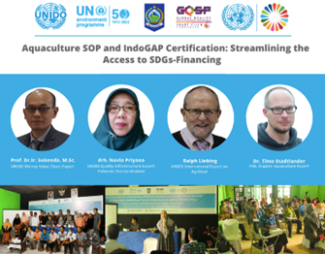Innovative financing for sustainable organic aquaculture in Indonesia
Paving the way towards job creation, inclusivity and, ultimately, social sustainability, the know-how associated with organic standards and sustainable cultivation practices is also projected to unlock the access to Sustainable Development Goals (SDGs) linked loans. As an innovative financing mechanism largely unfamiliar to the farming communities in rural Asia, it boasts a widely recognized potential of enabling local farmers to expand their businesses, investment sources, and cooperation opportunities through global market networks, while also supporting green economy initiatives at large.
Seeking to support the local government in strengthening productivity by adopting more sustainable shrimp farming practices, UNIDO and United Nations Environment Programme (UNEP) took further their collaboration in the UN Joint Programme “Accelerating SDGs Investment in Indonesia” (ASSIST) drawing synergies from the technical expertise of the UNIDO’s “Global Quality and Standards Programme (GQSP) Indonesia SMART Fish-2”. As part of this effort, on 12 May 2022 a hybrid awareness raising event was organized focusing on the Aquaculture Standard Operational Procedure (SOPs), “IndoGAP” Good Aquaculture Practice certification and Organic Shrimp Farming in Kidang Village, Central Lombok, was held by UNIDO’s aquaculture specialists and an international expert from the Research Institute of Organic Agriculture (Switzerland).
This learning initiative saw large involvement of shrimp farmers community based on Lombok Island, bringing into focus innovative and environmentally sound Vannamei shrimp cultivation approach that has a proven track record of helping to increase productivity and upgrade business performance. Additionally, the participants were introduced to the benefits of the transition towards organic aquaculture, which enables producers to improve their sales performance while reducing environmental impact through preserving biodiversity, avoiding the use of synthetic chemicals, and increased nutrient efficiency.
For further information contact Farrukh Alimdjanov (F.Alimdjanov [at] unido.org (F[dot]Alimdjanov[at]unido[dot]org)) and Steffen Kaeser (S.Kaeser [at] unido.org (S[dot]Kaeser[at]unido[dot]org))

